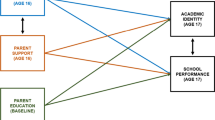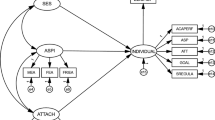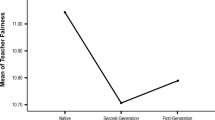Abstract
Although the number of students who complete high school continues to rise, dramatic differences in school success remain across racial/ethnic groups. The current study addressed Hispanic adolescents’ academic performance by investigating the relationships of parental involvement, culturally responsive teaching, sense of school belonging, and academic self-efficacy and academic performance. Participants were 478 (51.5% female) Hispanic 7th graders in the US-Mexico borderlands. Based on Bronfenbrenner’s ecological systems theory, a structural model was tested. Results showed that the proposed model was supported by demonstrating significant indirect effects of parental involvement, culturally responsive teaching, and sense of school belonging on academic performance. Furthermore, academic self-efficacy was found to mediate the relationships between parental involvement, culturally responsive teaching, and sense of school belonging and academic performance. The current study provides a useful psychoecological model to inform educators and psychologists who seek to meet the needs of Hispanic students.





Similar content being viewed by others
References
Bachman, J. G. (1970). Youth in transition, Vol. 2. The impact of family background and intelligence on tenth-grade boys. Ann Arbor, MI: Institute for Social Research.
Bentler, P., & Bonett, D. (1980). Significance tests and goodness of fit in the analysis of covariance structures. Psychological Bulletin, 88(3), 588–606. doi:10.1037/0033-2909.88.3.588.
Bong, M. (1999). Personal factors affecting the generality of academic self-efficacy judgments: Gender, ethnicity, and relative expertise. Journal of Experimental Education, 67(4), 315–331. doi:10.1080/00220979909598486.
Booker, K. C. (2004). Exploring school belonging and academic achievement in African American adolescents. Curriculum and Teaching Dialogue, 6, 131–143.
Booker, K. (2006). School belonging and the African American adolescent: What do we know and where should we go? The High School Journal, 89(4), 1–7.
Bronfenbrenner, U., & Morris, P. (1998). The ecology of developmental processes. Handbook of child psychology: Volume 1: Theoretical models of human development (5th ed., pp. 993–1028). Hoboken, NJ: Wiley.
Brown, M. W., & Cudeck, R. (1993). Alternative ways of assessing model fit. In K. A. Bollen & J. S. Long (Eds.), Testing structural equation models (pp. 136–162). Newbury Park, CA: Sage.
Center for American Progress. (2009, November 16). National service and youth unemployment: Strategies for job creation amid economic recovery. Retrieved September 26, 2010, from http://www.americanprogress.org/issues/2009/11/pdf/nation_service.pdf.
Davey, A., Savla, J., & Luo, Z. (2005). Issues in assessing model fit with missing data. Structural Equation Modeling, 12, 578–597.
Desimone, L. (1999). Linking parent involvement with student achievement: Do race and income matter? The Journal of Educational Research, 93(1), 11–30.
Dickson, G. L., & Chun, H. (2011). The development and validation of the student measure of culturally responsive teaching. Manuscript submitted for publication.
Domina, T. (2005). Leveling the home advantage: Assessing the effectiveness of parental involvement in elementary school. Sociology of Education, 78(3), 233–249.
Faircloth, B., & Hamm, J. (2005). Sense of belonging among high school students representing 4 ethnic groups. Journal of Youth and Adolescence, 34(4), 293–309. doi:10.1007/s10964-005-5752-7.
Fan, X. (2001). Parental involvement and students’ academic achievement: A growth modeling analysis. Journal of Experimental Education, 70(1), 27–61. doi:10.1080/00220970109599497.
Finn, J. (1989). Withdrawing from school. Review of Educational Research, 59(2), 117–142. doi:10.2307/1170412.
Gallimore, R., & Goldenberg, C. (2001). Analyzing cultural models and settings to connect minority achievement and school improvement research. Educational Psychologist, 36(1), 45–56. doi:10.1207/S15326985EP3601_5.
Gay, G. (2000). Culturally responsive teaching: Theory, research, and practice. New York: Teachers College Press.
Goodenow, C. (1993). The psychological sense of school membership among adolescents: Scale development and educational correlates. Psychology in the Schools, 30(1), 79–90. doi:10.1002/15206807(199301)30:1<79:AID-PITS2310300113>3.0.CO;2-X.
Goodenow, C., & Grady, K. (1993). The relationship of school belonging and friends’ values to academic motivation among urban adolescent students. Journal of Experimental Education, 62(1), 60–71.
Guyll, M., Madon, S., Prieto, L., & Scherr, K. C. (2010). The potential roles of self-fulfilling prophecies, stigma consciousness, and stereotype threat in linking Latino/a ethnicity and educational outcomes. Journal of Social Issues, 66(1), 113–130.
Hoover-Dempsey, K., Battiato, A., Walker, J., Reed, R., DeJong, J., & Jones, K. (2001). Parental involvement in homework. Educational Psychologist, 36(3), 195–209. doi:10.1207/S15326985EP3603_5.
Hu, L. T., & Bentler, P. M. (1998). Fit indices in covariance structure modeling: Sensitivity to underparameterized model misspecification. Psychological Methods, 3, 424–453. doi:10.1037/1082-989X.3.4.424.
Ibanez, G., Kuperminc, G., Jurkovic, G., & Perilla, J. (2004). Cultural attributes and adaptations linked to achievement motivation among Latino adolescents. Journal of Youth and Adolescence, 33(6), 559–568.
Izzo, C., Weissberg, R., Kasprow, W., & Fendrich, M. (1999). A longitudinal assessment of teacher perceptions of parent involvement in children’s education and school performance. American Journal of Community Psychology, 27(6), 817–839. doi:10.1023/A:1022262625984.
Jonson-Reid, M., Davis, L., Saunders, J., Williams, T., & Williams, J. (2005). Academic self-efficacy among African American youths: Implications for school social work practice. Children & Schools, 27(1), 5–14.
Kuperminc, G., Darnell, A., & Alvarez-Jimenez, A. (2008). Parent involvement in the academic adjustment of Latino middle and high school youth: Teacher expectations and school belonging as mediators. Journal of Adolescence, 31(4), 469–483. doi:10.1016/j.adolescence.2007.09.003.
Liang, X., & Zhang, G. (2009). Indicators to evaluate pre-service teachers’ cultural competence. Evaluation & Research in Education, 22(1), 17–31.
MacKinnon, D. P., Lockwood, C. M., Hoffman, J. M., West, S. G., & Sheets, V. (2002). A comparison of methods to test the significance of the mediated effect. Psychological Methods, 7(1), 83–104.
Mallinckrodt, B., Abraham, T. W., Wei, M., & Russell, D. W. (2006). Advance in testing statistical significance of mediation effects. Journal of Counseling Psychology, 53, 372–378.
Marchant, G., Paulson, S., & Rothlisberg, B. (2001). Relations of middle school students’ perceptions of family and school contexts with academic achievement. Psychology in the Schools, 38(6), 505–519. doi:10.1002/pits.1039.abs.
Marin, G., & Marin, B. V. (1991). Research with Hispanic populations. Newbury Park, CA: Sage.
Martinez, C., Jr., DeGarmo, D., & Eddy, J. (2004). Promoting academic success among Latino youths. Hispanic Journal of Behavioral Sciences, 26(2), 128–151. doi:10.1177/0739986304264573.
Meece, J., & Kurtz-Costes, B. (2001). Introduction: The schooling of ethnic minority children and youth. Educational Psychologist, 36(1), 1–7. doi:10.1207/S15326985EP3601_1.
Muthén, L. K., & Muthén, B. O. (2007). Mplus user’s guide (5th ed.). Los Angeles, CA: Muthén & Muthén.
Newcomb, M., & Bentler, P. (1988). Impact of adolescent drug use and social support on problems of young adults: A longitudinal study. Journal of Abnormal Psychology, 97(1), 64–75. doi:10.1037/0021-843X.97.1.64.
Osterman, K. E. (2000). Students’ need for belonging in the school community. Review of Educational Research, 70, 323–367.
Preacher, K., & Hayes, A. (2008a). Asymptotic and resampling strategies for assessing and comparing indirect effects in multiple mediator models. Behavior Research Methods, 40(3), 879–891. doi:10.3758/BRM.40.3.879.
Preacher, K. J., & Hayes, A. F. (2008b). Contemporary approaches to assessing mediation in communication research. In A. F. Hayes, M. D. Slater, & L. B. Snyder (Eds.), The Sage sourcebook of advanced data analysis methods for communication research (pp. 13–54). Thousand Oaks, CA: Sage.
Roeser, R., Midgley, C., & Urdan, T. (1996). Perceptions of the school psychological environment and early adolescents’ psychological and behavioral functioning in school: The mediating role of goals and belonging. Journal of Educational Psychology, 88(3), 408–422. doi:10.1037/0022-0663.88.3.408.
Rumberger, R., & Larson, K. (1998). Student mobility and the increased risk of high school dropout. American Journal of Education, 107(1), 1–35. doi:10.1086/444201.
Ryan, C., Casas, J., Kelly-Vance, L., Ryalls, B., & Nero, C. (2010). Parent involvement and views of school success: The role of parents’ Latino and White American cultural orientations. Psychology in the Schools, 47(4), 391–405.
Sanchez, B., Colon, Y., & Esparza, P. (2005). The role of sense of school belonging and gender in the academic adjustment of Latino adolescents. Journal of Youth and Adolescence, 34(6), 619–628.
Secada, W., Chavez-Chavez, R., Garcia, E., Munoz, C., Oakes, J., Santiago-Santiago, I., et al. (1998). No more excuses: The final report of the hispanic dropout project. Washington, DC: US Department of Education.
Shrout, P., & Bolger, N. (2002). Mediation in experimental and nonexperimental studies: New procedures and recommendations. Psychological Methods, 7(4), 422–445. doi:10.1037/1082-989X.7.4.422.
Steinberg, L., Lamborn, S., Dornbusch, S., & Darling, N. (1992). Impact of parenting practices on adolescent achievement: Authoritative parenting, school involvement, and encouragement to succeed. Child Development, 63(5), 1266–1281. doi:10.2307/1131532.
Tenenbaum, H., & Ruck, M. (2007). Are teachers’ expectations different for racial minority than for European American students? A meta-analysis. Journal of Educational Psychology, 99(2), 253–273. doi:10.1037/0022-0663.99.2.253.
Terrill, M., & Mark, D. (2000). Preservice teachers’ expectations for schools with children of color and second-language learners. Journal of Teacher Education, 51, 149–155.
Tyler, K., Dillihunt, M., Boykin, A., Coleman, S., Scott, D., Tyler, C., et al. (2008). Examining cultural socialization within African American and European American households. Cultural Diversity and Ethnic Minority Psychology, 14(3), 201–204. doi:10.1037/1099-9809.14.3.201.
US Census Bureau. (2000). State senate district quickfacts: New Mexico. Retrieved December 7, 2010, from http://quickfacts.census.gov.
US Census Bureau. (2001). The Hispanic population: Census 2000 brief. Washington, DC: US Census Bureau.
US Census Bureau. (2010). State and county quickfacts: New Mexico. Retrieved December 4, 2010, from http://quickfacts.census.gov.
US Department of Education, National Center for Education Statistics. (2005). The condition of education 2005 (NCES 2005-094).
Uwah, C., McMahon, H., & Furlow, C. (2008). School belonging, educational aspirations, and academic self-efficacy among African American male high school students: Implications for school counselors. Professional School Counseling, 11, 296–305.
Valentine, J. C., DuBois, D. L., & Cooper, H. (2004). The relation between self-beliefs and academic achievement: A meta-analytic review. Educational Psychologist, 39(2), 111–133.
Vygotsky, L. S. (1978). Mind in society: The development of higher mental processes. Cambridge, MA: Harvard University Press.
Worthington, R., & Whittaker, T. (2006). Scale development research: A content analysis and recommendations for best practices. The Counseling Psychologist, 34(6), 806–838. doi:10.1177/0011000006288127.
Yan, W., & Lin, Q. (2005). Parent involvement and mathematics achievement: Contrast across racial and ethnic groups. Journal of Educational Research, 99(2), 116–127.
Acknowledgments
The authors wish to thank Dr. Jonathan Schwartz and Dr. Michael Mobley for editorial assistance.
Author information
Authors and Affiliations
Corresponding author
Rights and permissions
About this article
Cite this article
Chun, H., Dickson, G. A Psychoecological Model of Academic Performance Among Hispanic Adolescents. J Youth Adolescence 40, 1581–1594 (2011). https://doi.org/10.1007/s10964-011-9640-z
Received:
Accepted:
Published:
Issue Date:
DOI: https://doi.org/10.1007/s10964-011-9640-z




